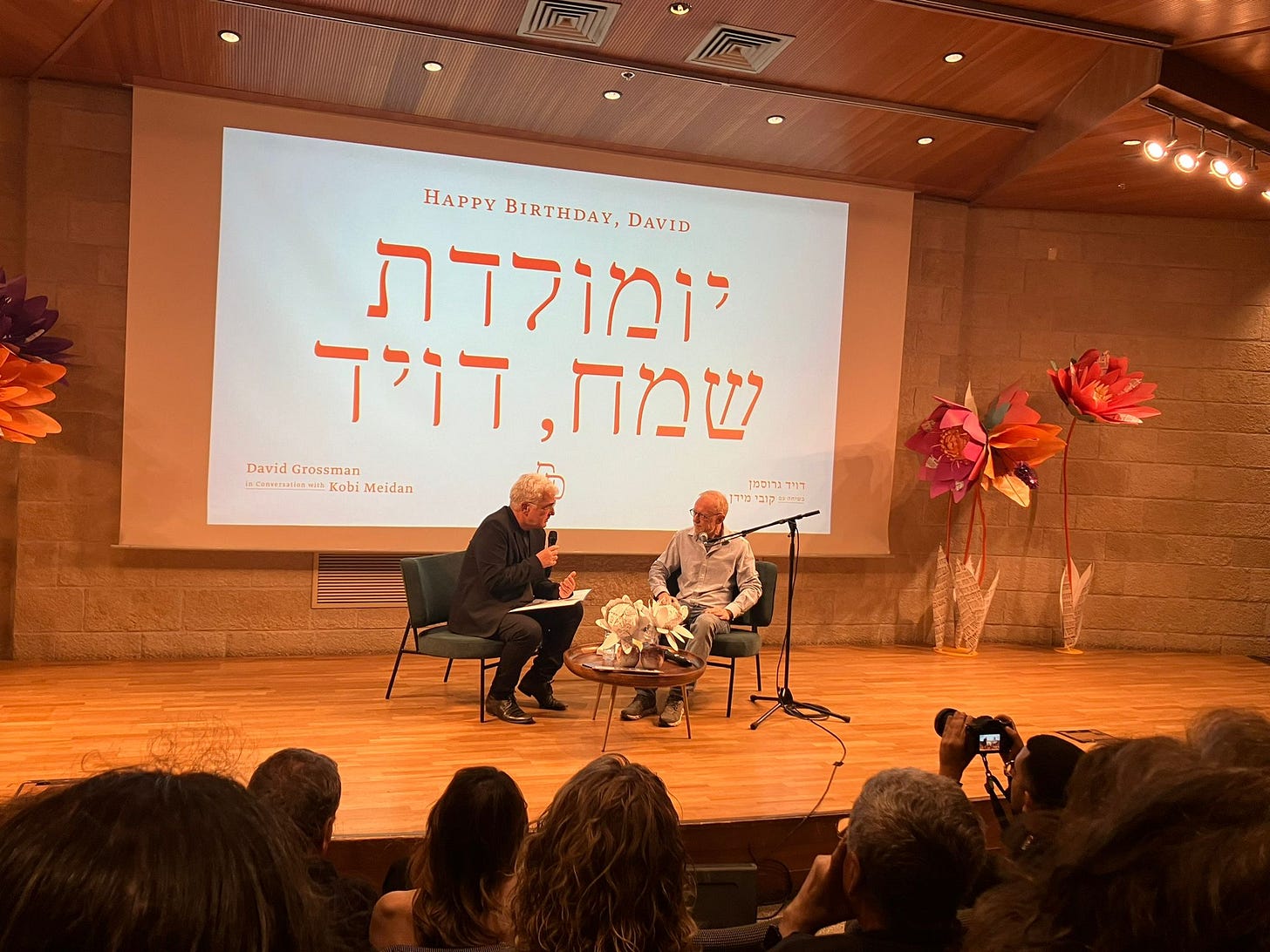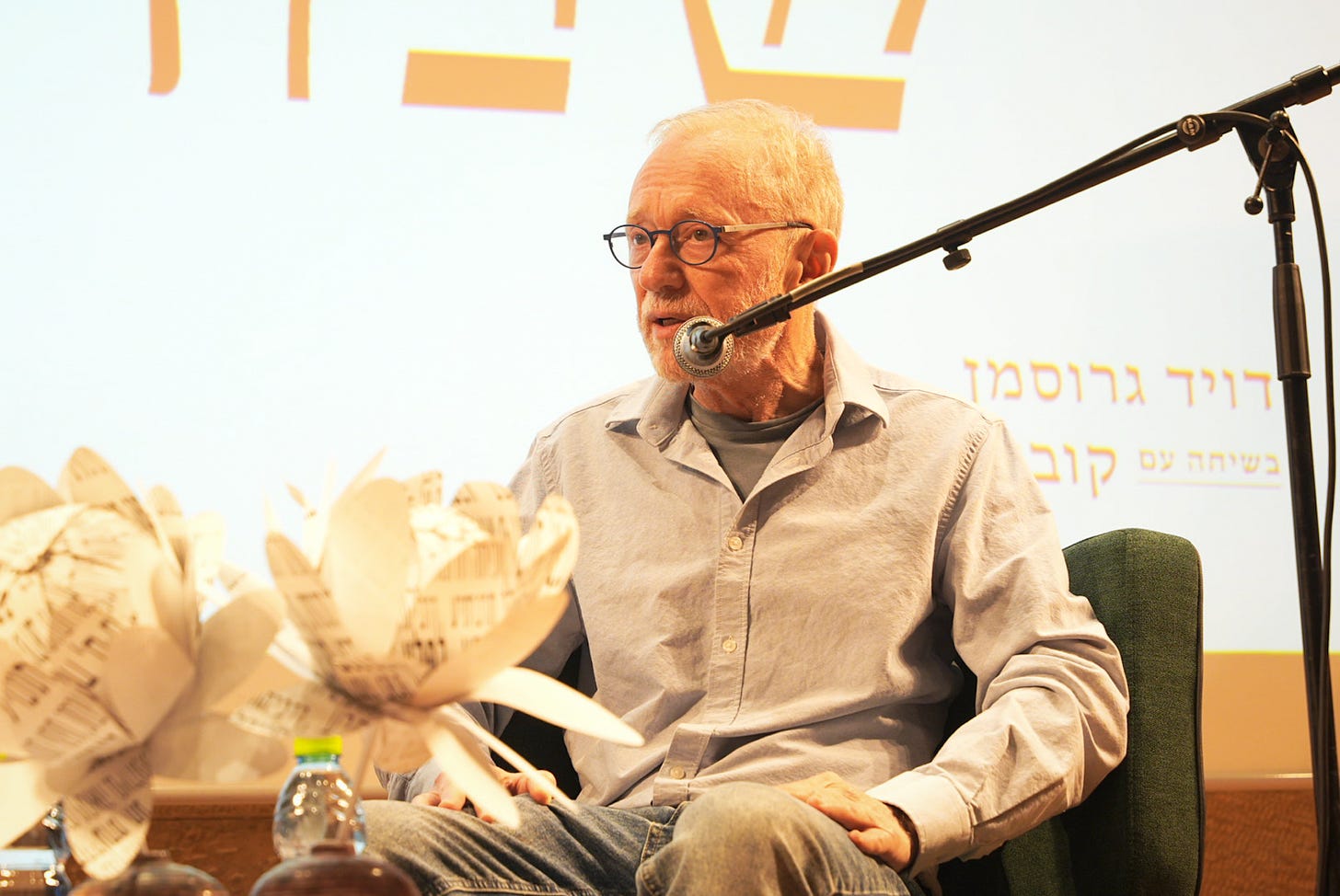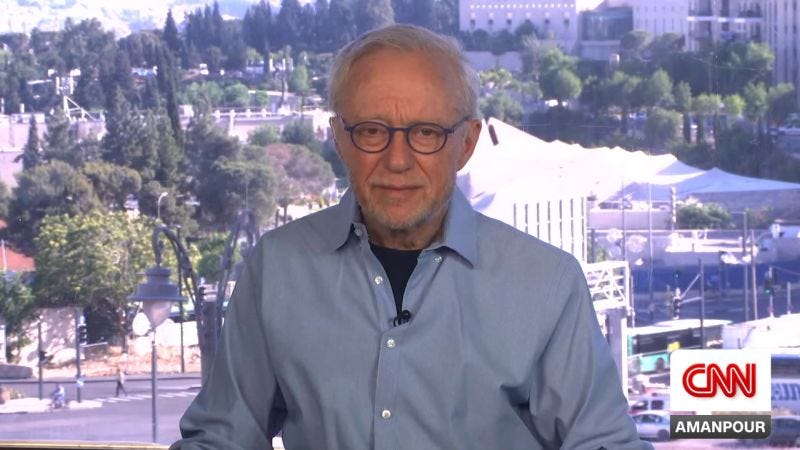There are many living Israeli authors worth reading, but David Grossman is in a class of his own.
On Wednesday night, a friend and I were lucky enough to see him live at the Jerusalem Writers Festival, where he was interviewed by journalist Kobi Meidan. Most of the conversation (naturally) centered around Oct 7th and the ensuing war - and he did not mince words when speaking about the current government (“one that seems to hate their people,”) and above all, the general mood (“profound sadness.”)
My view from the fourth row as part of “David Grossman’s 70th Birthday Celebration”
It’s been a horrendous month in Israel - with no progress in negotiations to free the hostages and newly surfaced videos forcing all to face the abuse they are currently suffering in captivity, with dire warnings from senior statesmen, cabinet ministers and local and international experts about the lack of strategy in the war, the recovered bodies of murdered hostages, the unsustainable economic and social conditions of the current system, the abandonment of Israel’s northern border, the growing scale of lives lost in Gaza, the unending list of names and photos released for publication after being killed in terror attacks or in military operations- with new names added almost every day (including this morning.)
So yes, profound sadness. More than worry, or anger, or shock, or hopelessness - Grossman managed to convey the basic feeling that defines our days right now.
Photo from the official facebook page of the Jerusalem Writers Festival
Some other tidbits from his talk:
He has a beard these days because he in mourning for his father, who died three weeks ago at age 97. He told of how his father, up until recently, used to go “undercover” to bookstores and move books around to ensure Grossman’s books were more prominently on the shelves and tables, even covering books from authors he deemed literary competitors. “Even as I reach this age, he never stopped caring for me.”
He read a few pages from his Booker Prize-winning novel, A Horse Walks Into a Bar, including a few paragraphs from the standup routine of the protagonist where he jokes about yearning for the “old antisemitism” (a opposed to “new antisemitism” where, in the case that a Jew one day finds a cure for cancer, the world would rise in uproar, citing the unfairness to cancer itself, and reminding us that cancer drugs have spurred new discoveries, so why end that?) We laughed and shook our heads in disbelief about the lines he wrote almost 8 years ago, and how relevant they feel now.
More than laugh, of course, he made many of us cry. We cried when he talked about slowly returning to write (“15 minutes at first, then 30”) after his son Uri was killed in Lebanon (he was in the final stages of To The End of the Land, his masterpiece about a mother who runs away to hide from the military “informers” who would bear news of her son’s death.) We continued tearing up when he spoke of the hostages, about the lack of options, about the difficulty of continuing to believe, to fight for peace. And we cried because we share the disorienting feeling of feeling that History hasn’t really accepted Jews again, and that even the very existence of the State of Israel is not something we can take for granted.
And yes, he also spoke about literature, including about his friendship with Paul Aster, or about books has read recently, such as Living With Our Dead by Rabbi Delphine Horvilleur (who was recently interviewed in English in the Haaretz podcast.)
Earlier this month, Grossman was interviewed by CNN’s Christiane Amanpour. The interview is well worth watching, even if there were moments that made me cringe, such as when Amanpour casually commented about the commonplace “ethnic cleansing” in the West Bank. (While I am far from defending the actions of messianic extremists, the clash between Grossman’s precise, thoughtful language and Amanpour’s broad-brushed accusations, especially coming from a journalist who first broke into the world stage with her coverage of the horrors of the Bosnian War, was jarring.)
Family updates: three out of the four kids are home this weekend— including the soldier (in my friend’s words, I can sleep now.) Earlier this week, A had a couple of rocket alarms at his workplace in Herzliya — rockets fired from Rafah towards Tel Aviv (crazy how sirens immediately trigger such a primal response in everyone.)
Tomorrow night I plan to make it to the local protest against the current government (which only seems to be dragging their feet, biding time for its own survival) then, as I’ve been doing for a few months, to the rally in support of the release of the hostages. And next week is the International Creative Writing Conference at Bar-Ilan, the prospect of which was the main thing that kept me going in this terrible month.
May June bring only good news, and may it bring the day we move past the shock and trauma and sadness, and begin to place our energies into rebuilding —our society, our country, our region and our place in the world.






One of my favourite authors. Truly in a class all his own. I heard him speak once, at the JCC in San Fransisco 10 years ago. I would love to have heard him speak.